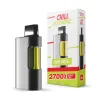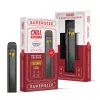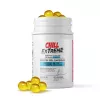THCP, or tetrahydrocannabiphorol, is a groundbreaking cannabinoid that has emerged in the ever-evolving cannabis industry. As an extraordinarily potent variant of THC, THCP has caught the attention of consumers and researchers alike. This unique compound transcends the conventional cannabis experience, propelling users into an exhilarating journey up into the clouds.
Importance of Understanding THCP
In the post-Farm Bill epoch, the cannabis market has experienced a renaissance, giving rise to numerous novel compounds infusing such things as delta 8 products, HHC products, delta 10 products, and so much more. These cannabinoids have reshaped the industry, providing an array of innovative, legally compliant products to broaden the horizons of countless individuals. Amidst this remarkable transformation, THCP stands out as a game-changer, allowing users to bypass the learning curve and soar directly into the celestial realm. Comprehending the nature of THCP and its unparalleled potency is crucial in order to fully appreciate its potential and navigate the rapidly expanding universe of cannabis.
As our understanding of the cannabis plant expands, new and fascinating cannabinoids are being discovered regularly, including tetrahydrocannabiphorol (THCP). It’s piqued the interest of researchers and enthusiasts alike. In this guide, we'll delve into the world of THCP and explore its definition, how it differs from other cannabinoids, the science behind it, and its discovery.
What Is THCP?
THCP is a naturally occurring compound found in the cannabis plant, known as a cannabinoid. More specifically, it is a homolog of the well-known psychoactive cannabinoid delta-9-tetrahydrocannabinol (THC). While it shares similarities with THC, THCP boasts unique chemical properties that set it apart from other cannabinoids.
How is THCP Different from Other Cannabinoids?
THCP stands out from other cannabinoids due to its higher affinity for the CB1 receptor in the human endocannabinoid system. This receptor plays a crucial role in mediating the psychoactive effects of cannabis. With a binding affinity 33 times greater than that of THC, THCP has the potential to be a more potent psychoactive compound. However, more research is needed to understand the full extent of THCP's effects on the human body.
The discovery of THCP was made by a team of Italian scientists in 2019 while they were investigating the chemical composition of cannabis plants. Their findings were published in the journal Scientific Reports, highlighting THCP as a previously unknown phytocannabinoid. This discovery has opened up new avenues of research to explore the potential benefits and implications of THCP for medicinal and recreational purposes. As we continue to learn more about the diverse array of cannabinoids, it is important to recognize the complexity of the cannabis plant and its potential to offer novel compounds for a variety of applications.
The Science Behind THCP
THCP is a phytocannabinoid that shares a molecular structure similar to THC, but it has a longer alkyl side chain. This distinction in structure is what enables THCP to have an enhanced binding affinity for the CB1 receptor, which is primarily responsible for the psychoactive effects of cannabis. Due to this increased affinity, there is potential for THCP to exhibit stronger effects than THC, providing a more potent experience for users.
However, it is crucial to emphasize that the psychoactive effects of THCP are still under investigation, and the current understanding is based on preliminary studies. Further research is necessary to confirm these findings and to fully comprehend the potential implications of THCP on both medicinal and recreational use. As our knowledge of cannabinoids continues to expand, it will be fascinating to see how the discovery of compounds like THCP might impact the future of cannabis-related products and therapies.
How Was THCP Discovered?
THCP was first discovered in 2019 by a team of Italian scientists led by researcher Dr. Cinzia Citti. The team isolated and characterized THCP from an Italian medicinal cannabis strain, known as FM2, which was obtained from the Military Chemical Pharmaceutical Institute in Florence. They used advanced analytical techniques, including liquid chromatography and mass spectrometry, to identify the compound and determine its chemical structure. The discovery of THCP has opened up new avenues of research into the potential therapeutic applications of this novel cannabinoid.

Does THCP Get You High?
While the full extent of THCP's psychoactive properties is still being investigated, preliminary research suggests that it could potentially get you high. THCP has a significantly higher affinity for the CB1 receptor in the human endocannabinoid system compared to THC, which is responsible for the psychoactive effects of cannabis. This increased affinity could lead to more potent psychoactive effects, resulting in a more intense high. However, it is important to emphasize that further research is required to confirm the psychoactive potential of THCP and to understand its effects on the human body.
The Potential Psychoactive Effects of THCP
THCP has garnered significant attention due to its potential psychoactive effects. Research has shown that the compound has a 33 times higher affinity for the CB1 receptor compared to THC, which is the primary psychoactive component in cannabis. This suggests that THCP could have stronger psychoactive effects than THC, leading to a more intense high.
However, it is important to note that the full extent of THCP's psychoactive properties is still being investigated. Further studies are necessary to determine the precise nature of THCP's effects on the human body and to explore its potential applications in medical and recreational contexts.
Comparison with Other Cannabinoids Like THC
While THC is the most well-known psychoactive cannabinoid, there are over 100 cannabinoids present in the cannabis plant. Each cannabinoid has a unique chemical structure and interacts with the human endocannabinoid system in different ways. This results in a diverse range of effects, from the euphoria and relaxation typically associated with THC to the non-intoxicating, therapeutic effects of CBD.
In comparison to THC, THCP's molecular structure is distinguished by a longer alkyl side chain. This distinction is believed to be responsible for its higher affinity for the CB1 receptor, potentially leading to more potent psychoactive effects. However, it is essential to emphasize that our understanding of THCP's properties is still in its infancy. More research is required to confirm the psychoactive potential of THCP and to determine how it compares to other cannabinoids in terms of potency and effects on the human body.

What Are the Benefits of THCP?
Though research into the potential benefits of THCP is still in its early stages, preliminary findings suggest that this novel cannabinoid may hold promise in various applications. THCP's strong affinity for the CB1 receptor could mean that it has a more potent effect on the human endocannabinoid system than other cannabinoids, which might translate to more effective relief for conditions such as chronic pain, inflammation, and anxiety.
It's important to note, however, that more in-depth studies are needed to fully understand the therapeutic potential of THCP and to establish its efficacy and safety profile.
THCP’s Medical Benefits vs. Recreational Benefits
In addition to its potential therapeutic applications, THCP could also contribute to the "entourage effect" observed in cannabis, where the combined action of multiple cannabinoids and other plant compounds leads to a synergistic effect that enhances the overall therapeutic value of the plant. By interacting with other cannabinoids, such as THC and CBD, THCP may contribute to an enhanced overall experience for users, potentially improving the effectiveness of medical cannabis treatments.
However, as with its direct medical applications, further research is essential to better understand the role of THCP in the entourage effect and to determine its specific contributions to the therapeutic potential of cannabis. For a closer look at how THCP may (and we stress may) benefit you, take a look at the table below:
|
Cannabinoid |
Medical Benefits |
Recreational Benefits |
|---|---|---|
|
THCP |
|
|
|
|
|
|
How THCP Affects the Body
THCP, like other cannabinoids, interacts with the body's endocannabinoid system (ECS), a complex cell-signaling system that plays a crucial role in regulating various physiological processes. The ECS comprises of two primary receptors, CB1 and CB2, which are found throughout the body. THCP has an affinity for the CB1 receptor that is 33 times greater than that of THC, which indicates that it may have a more potent effect on the body.
When THCP binds to the CB1 receptor, it can modulate various physiological responses, such as appetite, mood, and pain perception. However, the full extent of THCP's effects on the body is still not entirely understood, as research on this novel cannabinoid is in its early stages. Further studies are required to gain a more comprehensive understanding of how THCP interacts with the endocannabinoid system and its potential therapeutic and recreational applications.
THCP Products
As interest in THCP grows, various products containing this novel cannabinoid have emerged in the market. These products aim to offer the potential benefits of THCP to consumers, and they come in diverse forms to cater to different preferences and needs. Some might say that THCP products can offer the ultimate chill.

Types of THCP Products Available
Some popular THCP products include gummies, vape cartridges, disposable vapes, tinctures, and capsules. THC gummies are extremely popular today and they make for a discreet and convenient way to consume THCP, providing a tasty and controlled dose. THC carts are popular too, which is why vape cartridges and disposable vapes are designed for those who prefer inhalation as their method of consumption, allowing for faster onset of effects. Tinctures and capsules, on the other hand, offer a more controlled and measurable dosage for those seeking a consistent and long-lasting experience.
- THCP Gummies
- Discreet and convenient
- Tasty and controlled dose
- Ideal for oral consumption
- THCP Carts
- Preferred method for inhalation
- Allows for faster onset of effects
- Compatible with standard vape devices
- THCP Disposable Vapes
- Designed for one-time use
- Convenient and easy to use
- Provides quick absorption of THCP through inhalation
Though not as common, the following products may also be found on the marketplace:
- THCP Tinctures
- Controlled and measurable dosage
- Administered under the tongue for maximum absorption
- Suitable for consistent and long-lasting effects
- THCP Capsules
- Easy to ingest orally with water
- Provides a precise and consistent dose
- Ideal for those seeking a stable, long-lasting experience
How to Use THCP Products
The method of using THCP products depends on the type of product chosen. For gummies, simply consume them orally as you would with any other edible. When using vape cartridges or disposable vapes, inhale the vapor generated by the device, and the THCP will be absorbed through the lungs. For tinctures, place the recommended number of drops under your tongue, hold for a few seconds, and then swallow to allow for maximum absorption. Capsules can be ingested orally with water, just like any other supplement.
Dosage Information
Determining the right dosage of THCP is essential to ensure a safe and enjoyable experience. As THCP is a relatively new cannabinoid and research is still ongoing, it is advisable to start with a low dose and gradually increase it as needed. Pay close attention to how your body reacts to the cannabinoid, and consult a healthcare professional if you have any concerns or questions about incorporating THCP into your routine. Always follow the manufacturer's recommendations and guidelines for the specific product you are using.
For some general dosing information, check out the table below:
|
User Type |
THCP Gummies |
THCP Vape Cartridges |
THCP Disposable Vapes |
|---|---|---|---|
|
New Users |
1-2.5 mg per gummy |
1-2 puffs (3 sec) |
1-2 puffs (3 sec) |
|
Occasional Users |
2.5-5 mg per gummy |
2-4 puffs (3 sec) |
2-4 puffs (3 sec) |
|
Experienced Users |
5-10 mg per gummy |
4-6 puffs (3 sec) |
4-6 puffs (3 sec) |
Safety and Legality of THCP
As a relatively new and understudied cannabinoid, the safety profile of THCP is not yet fully understood. However, it is important to approach its use with caution, especially given its higher affinity for the CB1 receptor compared to THC.
Safety Concerns
New users should approach THCP with caution, starting with a low dose and gradually increasing it to determine their individual tolerance level. It is essential to closely monitor one's reactions to THCP, as its higher affinity for the CB1 receptor could potentially lead to stronger psychoactive effects compared to other cannabinoids like THC. Pregnant or nursing women, individuals with pre-existing medical conditions, and those taking medications should consult with a healthcare professional before using THCP products, as there may be potential interactions or contraindications.
Additionally, it is important to ensure that the THCP products being used come from reputable sources, as the quality, purity, and consistency of these products can vary significantly between manufacturers. Properly labeled and tested products will help users avoid contaminants, such as pesticides or heavy metals, that may pose additional health risks. In summary, while THCP may offer a range of potential benefits, users should exercise caution, start with low doses, and consult with a medical professional if they have any concerns about its safety.

Legal Status of THCP
The legality of THCP varies depending on the country, state, or region. In some places, it may be classified as a controlled substance or be subject to restrictions similar to those imposed on THC. Users should research the specific regulations in their area to ensure compliance with local laws. Furthermore, as the legal status of cannabinoids is subject to change, staying up-to-date on regulatory developments is crucial.
Potential Risks and Side Effects
While the full extent of THCP's potential risks and side effects is not yet known, some users may experience symptoms similar to those associated with THC use, such as dizziness, dry mouth, paranoia, or increased heart rate. If side effects occur, users should discontinue use and consult a healthcare professional if necessary.
To see how the benefits of THCP compare to the risks, take a look at the table below:
|
Benefits of THCP |
Side Effects of THCP |
|---|---|
|
Enhanced binding affinity to CB1 receptors |
Potential for stronger psychoactive effects |
|
Potential for stronger analgesic effects |
Anxiety |
|
Possible anti-inflammatory properties |
Paranoia |
|
Potential for wellness properties |
Dry mouth |
|
May help with sleep and relaxation |
Dizziness |
|
Potential to reduce nausea and vomiting |
Increased heart rate |
|
Extreme euphoria |
Memory impairment |
|
Other recreational benefits |
Impaired motor function |
Will THCP Trigger a Drug Test?
It is possible that THCP may trigger a positive result on a drug test, as these tests often target cannabinoids in general, rather than just THC. However, the likelihood of a false positive depends on the specific test being used and the sensitivity of the testing method. Users concerned about drug testing should be aware of this potential risk when using THCP products.
THCP vs. Other Cannabinoids
THCP is a relatively new cannabinoid that has garnered attention due to its stronger binding affinity to the CB1 receptor compared to other cannabinoids. This could potentially result in more potent psychoactive and therapeutic effects. THC, the most well-known cannabinoid, is responsible for the characteristic "high" associated with cannabis use, while CBD is known for its non-psychoactive therapeutic effects. THCP shares similarities with THC in terms of its molecular structure, but its longer alkyl side chain sets it apart and potentially enhances its effects.
Other cannabinoids, such as CBG and CBN, have also been studied for their therapeutic potential, with CBG showing promise as an anti-inflammatory and antibacterial agent and CBN potentially offering sedative effects. However, THCP's unique structure and properties make it an intriguing subject for further research, as it could potentially offer stronger benefits or a different range of effects compared to other cannabinoids. It's essential to note that more research is needed to fully understand THCP and its place among the other cannabinoids in the cannabis plant.
Comparing THCP to THC, Delta 8, Delta 10, and HHC
Curious as to how THCP actually compares to other cannabinoids like delta 8 or delta 10? How does it stack up against HHC? Take a look at our in-depth table below:
|
Cannabinoid |
Psychoactive Effects |
Binding Affinity |
Potential Benefits |
Legal Status |
|---|---|---|---|---|
|
THCP |
Potentially strong |
High |
Under investigation, possibly potent |
Varies by jurisdiction |
|
Delta-8 THC |
Mild |
Moderate |
Antiemetic, analgesic, anxiolytic |
Varies by jurisdiction, often legal |
|
Delta-9 THC |
Strong |
High |
Analgesic, anti-inflammatory, appetite stimulant |
Varies by jurisdiction, illegal in some places |
|
Delta-10 THC |
Mild to moderate |
Moderate |
Under investigation |
Varies by jurisdiction, often legal |
|
CBD |
Non-psychoactive |
Low |
General Wellness |
Generally legal
|
Current THCP Research
Research into THCP is still in its early phases, but it is exciting. For example, in addition to THCP, scientists also discovered cannabidiphorol (CBDP), a cannabinoid with a seven-carbon chain. CBDP is sometimes referred to as CBD-C7 or CBD-heptyl. Currently, less information is available about CBDP compared to THCP. Researchers have not prioritized the study of CBDP since CBD itself exhibits minimal interaction with CB1 and CB2 receptors, suggesting that the additional two carbons in CBDP's chain may not significantly impact receptor binding. Consequently, there is no ongoing research specifically focused on CBDP and its potential effects.
Moreover, the discovery has led to researchers looking at cannabinoids in a whole new way. In the “Journal of Studies on Alcohol and Drugs,” researchers looked at THCP and other compounds to ask how we should now classify these new compounds. The 2018 U.S. Federal Agriculture Improvement Act, or "Farm Bill," has led to a surge in various cannabis products and terminology. The recommended term for these products is "derived psychoactive cannabis products" (DPCPs), which is broad yet specific enough to cover all related substances while promoting clarity and consistency in scientific literature, researchers found.
Manufacturing and Dosage
THCP is synthesized through a process similar to that of other cannabinoids, involving a series of steps to ensure purity and concentration. Initially, the cannabis plant undergoes an extraction process, typically using a solvent such as carbon dioxide or ethanol, to separate the desired cannabinoids from plant material. This extraction yields a crude oil that contains a mixture of cannabinoids, terpenes, and other compounds.
How THCP Is Manufactured
Following the initial extraction, a purification process is employed to isolate specific cannabinoids, such as THCP, from the crude oil. Techniques such as chromatography or distillation are utilized to separate and refine the desired compound, ensuring a high level of purity and potency. After the isolation and purification of THCP, the resulting concentrate can be further processed and incorporated into various product formulations.
Once isolated, THCP can be infused into a wide range of products tailored to different consumption methods and preferences. These include edibles like gummies, which offer a discreet and convenient option for users, and vape cartridges or disposable vapes for those who prefer inhalation. Tinctures and capsules provide an alternative for users seeking a more controlled and measurable dosage, while topicals and transdermal patches cater to localized relief and systemic effects. This versatility in product options allows consumers to choose the most suitable method for their individual needs and lifestyle.
Proper Dosage for THCP
Determining the proper dosage for THCP is subjective and depends on factors such as individual tolerance, body weight, and experience with cannabinoids. New users should start with a low dose and gradually increase as needed. It is important to consult a healthcare professional, especially for individuals with pre-existing medical conditions or those taking medications, before using THCP products.

THCP Potency and Effects
Initial research suggests that THCP is significantly more potent than THC, with a binding affinity 33 times greater for the CB1 receptor. However, further studies are needed to fully understand the extent of THCP's potency and its effects on the human body compared to other cannabinoids.
Is THCP Synthetic or Natural?
THCP, or tetrahydrocannabiphorol, is a naturally occurring cannabinoid present in the cannabis plant. Although it is not as abundant as some of the more well-known cannabinoids like THC and CBD, THCP is still derived from the same plant sources. It is important to note that THCP is not a synthetic compound, as it is not artificially created in a laboratory setting from chemical precursors.
However, the process of extracting and isolating THCP from the cannabis plant for use in various products can be considered a form of synthesis. This involves employing specific techniques to separate and concentrate the cannabinoid from the plant material, ensuring its purity and potency. Once isolated, THCP can be infused into a wide range of products, such as edibles, vape cartridges, tinctures, and topicals.
Despite its natural origins, the increasing interest in THCP has led to advancements in cannabinoid research and the development of methods to produce it more efficiently. Scientists are exploring various techniques to enhance the extraction and synthesis process, which may ultimately result in the creation of new cannabinoid compounds with unique properties and potential therapeutic applications.
How Does THCP Make You Feel?
The effects of THCP can vary from person to person, and further research is required to fully understand its impact on the human body. Some users report a more intense psychoactive experience compared to THC, while others may find it more manageable. As with any cannabinoid, the individual's tolerance, dosage, and method of consumption can influence the overall experience.
Where to Find THCP
As interest in THCP continues to grow, consumers have more options than ever before to purchase THCP-infused products. The availability of THCP products may vary depending on your location and the legal status of cannabis in your area. However, there are several common sources for finding THCP products.
- Local dispensaries and specialized cannabinoid shops are often the best places to start your search. These establishments typically carry a wide range of cannabinoid-infused products, including THCP. In addition to offering a variety of options, these brick-and-mortar stores provide the advantage of having knowledgeable staff who can help guide you in finding the right product for your needs.
- Online retailers are another popular option for purchasing THCP products. Many companies now offer a diverse selection of THCP-infused items, such as gummies, tinctures, vape cartridges, and capsules. Shopping online allows you to browse and compare different products at your own pace, as well as read customer reviews to help make an informed decision. However, when purchasing online, it is essential to ensure that you are buying from a reputable and trustworthy source.
- Finally, some health and wellness stores may also carry THCP products. These stores often focus on natural and holistic remedies, making them a suitable place to find cannabinoid-infused products. It is always a good idea to ask for recommendations or do some research to find the most reliable and high-quality THCP products available.

Final Thoughts on THCP
THCP is a recently discovered cannabinoid with a molecular structure similar to THC, but with a longer alkyl side chain. This difference in structure results in a higher binding affinity for the CB1 receptor, potentially leading to stronger psychoactive effects compared to THC. While research on THCP is still in its early stages, preliminary studies suggest potential medical benefits and a unique set of effects compared to other cannabinoids.
Future Outlook for THCP
As interest in THCP continues to grow, it is expected that more research will be conducted to further explore its potential benefits, side effects, and overall impact on the human body. As scientific understanding of THCP increases, we may see the development of new products and therapies that harness the unique properties of this cannabinoid. However, it is crucial to remember that the current body of research on THCP is limited, and many aspects of its effects and safety profile remain unknown.
Final Thoughts and Recommendations
For those considering trying THCP products, it is essential to consult with a healthcare professional, particularly if you have pre-existing medical conditions or are taking medications. Start with a low dose and gradually increase as needed to determine your individual tolerance level. When purchasing THCP products, ensure that you are buying from a reputable and trustworthy source, and always stay informed about the legal status of cannabis products in your area.
As the scientific community continues to explore the world of cannabinoids, THCP is emerging as a compound with potential benefits and unique properties. While more research is needed to fully understand the implications of THCP, it is an exciting development in the field of cannabinoid research that may lead to new and innovative applications in the future.







